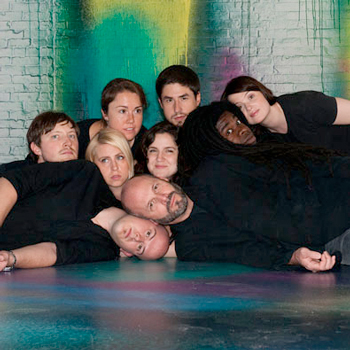by Mike Telin

On Friday, March 20 at 7:30 in Gartner Auditorium at the Cleveland Museum of Art, Wells and his eight-member ensemble, will present a concert featuring music from their 2014 Grammy-winning album, including ensemble member Caroline Shaw’s Pulitzer Prize-winning Partita for 8 Voices.
In addition to Western classical singing, Roomful of Teeth’s musical styles include Tuvan and Inuit throat singing, yodeling, belting, Korean P’ansori, Georgian singing and Sardinian cantu a tenore. Wells became curious about the technical possibilities of the voice while in college. “I was listening to Meredith Monk and non-classical singing at the same time as I was performing and studying the vocal music of Stockhausen, Berio and Cage, which I was fascinated by and found compelling. Those composers were among the first to look beyond the bel canto sound and use techniques like the rolling of the tongue and the sound of laughter and talking. But I think even the classical audience found it difficult to engage with those sounds primarily because there was no precedent for their being expressive of emotions.”
During the 1980s and ‘90s Wells was introduced to the music of a number of non-Western vocal traditions such as the Bulgarian Women’s Choirs and throat singers. “When I heard these singers I thought, OK, the voice is being used in distinctly different ways that have evolved over hundreds if not thousands of years. And the music means something powerful to those communities.”
Roomful of Teeth members are all committed to studying the different vocal techniques they are required to perform, which they do together each summer during their residency at Massachusetts Museum of Contemporary Art (Mass MoCA). It is there that new repertoire is also created by members of the group who are also composers, as well as invited composers. “What we like to do is to have the composers really get to know each singer and their range of skills in all of the different arenas that we’ve studied,” Wells said. “During the first couple of days of the residency each composer will meet individually with singers, who will demonstrate what they sound like when yodeling, throat singing or belting. The composers will take notes and make recordings, and based on how they respond to what the singers can do, their piece will take shape. There are many examples of pieces where certain effects were written because the composer knew a singer could perform them.”
In addition to Caroline Shaw’s Partita, Friday’s program will include Judd Greenstein’s A E I O U and Montmartre, and Rinde Eckert’s Cesca’s View. The program will also feature works from their soon-to-be-released CD. “William Brittelle’s High Done No Why To is on our album that will be released next month. It’s fantastic, virtuosic and slightly jazzy. There’s also a beautiful piece by Eric Dudley, the tenor in the group. It’s a real gem that’s set to a text he wrote. It has six members singing in an English choral style, but above them, the two sopranos are singing in Italian in a bel canto style.”
Why did Brad Wells choose Roomful of Teeth as the ensemble’s name? “It’s out of a desire to come up with a more rock and roll-sounding name for a classical ensemble — Bang on a Can was really the inspiration. I was also trying to think of something in English that sounded casual and vivid. When I thought of vocal chamber music, the word chamber made me think of room, then the room of the mouth, and then room full of teeth. Teeth are the most permanent part of our body. They last much longer after the rest of our bones have decayed. I like that dramatic juxtaposition between teeth and the voice, which disappears as quickly as we speak or sing.”
Wells looks forward to introducing Cleveland audiences to his group. “For people who don’t listen to a lot of new music, or a lot of vocal music from the last fifty years, at first we can sound kind of weird. But I think if you’re in a room with the ensemble, you’ll discover the beauty in these combinations of sounds.”
Published on ClevelandClassical.com March 17, 2015.
Click here for a printable copy of this article


